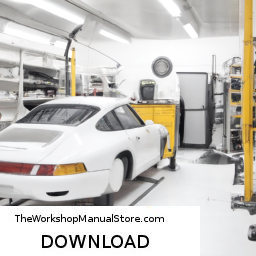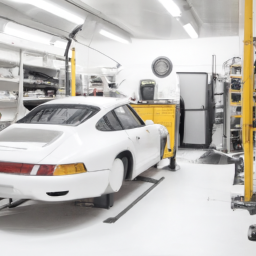
Replacing the transmission mount on a Porsche 928 involves several steps and requires a good understanding of automotive repair. Click here to view the download manual and more info…..
- Porsche 928 Transmission Diagnosis We diagnosed a B2 piston failure on this 928. We updated it with the most current parts available for the 722 transmission. Now its …
- Porsche 928 Ignition Computer Check This component is an important part of the 928’s startup. This video takes a quick look inside to check for water damage and or …
Below, I’ll outline the detailed procedure, including the components you will need and the steps to follow.
### Tools and Materials Needed:
1. **Tools:**
– Socket set (metric)
– Torque wrench
– Screwdrivers (flathead and Phillips)
– Pliers
– Jack and jack stands (or a hydraulic lift)
– Transmission jack or support
– Pry bar
– Rubber mallet
– Safety goggles and gloves
2. **Replacement Parts:**
– New transmission mount (specific to Porsche 928)
– Replacement bolts (if necessary)
– Thread locker (like Loctite, optional)
### Safety Precautions:
– Always wear safety goggles and gloves.
– Work in a well-ventilated area.
– Ensure the vehicle is on a level surface and securely supported with jack stands.
### Step-by-Step Instructions:
#### step 1: Preparation
– **Disconnect the Battery:** Start by disconnecting the negative terminal of the battery to prevent any electrical short circuits while you work on the car.
#### step 2: Raise the Vehicle
– **Lift the Car:** Use a hydraulic lift or jack stands to raise the vehicle. Ensure it’s securely supported.
#### step 3: Locate the Transmission Mount
– **Identify the Mount:** The transmission mount is typically located at the rear of the transmission, where it connects to the chassis. On the Porsche 928, it’s a rubber and metal component that absorbs vibrations from the transmission.
#### step 4: Support the Transmission
– **Use Transmission Jack:** Place a transmission jack or a support under the transmission to hold it in place once the mount is removed. This is crucial to prevent the transmission from dropping unexpectedly.
#### step 5: Remove the Old Transmission Mount
1. **Locate the Bolts:** Find the bolts securing the transmission mount to the transmission and the chassis.
2. **Remove the Bolts:**
– Use the appropriate socket to remove the bolts from the transmission side first. You may need to use a pry bar to help break them loose if they are stuck.
– Once the transmission bolts are out, proceed to the chassis side bolts and remove those as well.
3. **Remove the Mount:** Carefully slide the mount out of its position. If it’s stuck, gently tap it with a rubber mallet or use a pry bar to help ease it out.
#### step 6: Inspect Components
– **Check for Damage:** Before installing the new mount, inspect the surrounding components, including the transmission, crossmember, and any other mounts for signs of wear or damage.
#### step 7: Install the New Transmission Mount
1. **Position the New Mount:** Align the new mount with the mounting holes in the transmission and chassis.
2. **Install the Bolts:**
– Start by hand-threading the bolts into the transmission side first. Ensure they are lined up correctly.
– Once the transmission side bolts are in place, move to the chassis side and install those bolts.
3. **Tighten the Bolts:**
– Use a torque wrench to tighten the bolts to the manufacturer’s specifications. This information can typically be found in a service manual or online resources for the Porsche 928.
#### step 8: Recheck Mount Alignment
– **Ensure Proper Alignment:** Before fully tightening everything, double-check that the mount is aligned properly and that the transmission is securely supported.
and that the transmission is securely supported.
#### step 9: Reassemble and Lower the Vehicle
1. **Reconnect Any Removed Components:** If you had to remove any components to access the mount (like exhaust or heat shields), reinstall them now.
2. **Lower the Vehicle:** Carefully lower the vehicle back to the ground.
#### step 10: Reconnect the Battery
– **Reconnect the Battery:** Reattach the negative terminal of the battery.
#### step 11: Test Drive
– **Test the Vehicle:** Start the vehicle and take it for a test drive to ensure everything is functioning correctly. Listen for unusual noises and check for any vibrations that may indicate improper installation.
### Conclusion
Replacing a transmission mount on a Porsche 928 is a straightforward process but requires attention to detail and proper safety precautions. If you encounter any difficulties or uncertainties during the replacement, consult a professional mechanic or refer to a service manual for additional guidance.
The clutch pressure plate bolt is a crucial component in the automotive clutch assembly, playing a vital role in the engagement and disengagement of the vehicle’s transmission system. Typically made of high-strength steel, these bolts are designed to withstand the considerable forces generated during the operation of the clutch. The primary function of the clutch pressure plate bolt is to secure the pressure plate to the flywheel, ensuring that the pressure plate maintains appropriate tension against the clutch disc. This tension is essential for effective power transfer from the engine to the transmission; it allows the clutch to engage and disengage smoothly, enabling the driver to shift gears without damaging the transmission.
When the driver presses the clutch pedal, the pressure plate is pulled away from the clutch disc, allowing the gears to shift. The bolts must be tightened to specific torque specifications to prevent slippage and ensure even pressure distribution across the clutch assembly. Over time, these bolts can experience wear and fatigue due to the repetitive stress of engagement and disengagement cycles. Therefore, it’s crucial to inspect and replace them as necessary during clutch maintenance or replacement. Proper installation and maintenance of the clutch pressure plate bolts are essential for the overall performance and reliability of a vehicle’s clutch system, directly impacting drivability and safety.